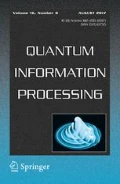Abstract
Yu et al. have proposed the first authenticated semi-quantum key distribution (ASQKD) without using an authenticated classical channel. This study further proposes two advanced ASQKD protocols. Compared to Yu et al.’s schemes, the proposed protocols ensure better qubit efficiency and require fewer pre-shared keys. Security analyses show that the proposed ASQKD protocols also can be secure against several well-known outside eavesdropper’s attacks.


Similar content being viewed by others
References
Wiesner, S.: Conjugate coding. SIGACT News 15(1), 78–88 (1983)
Bennett, C. H., Brassard, G.: Quantum cryptography: public key distribution and coin tossing. In: Proceedings of the IEEE International Conference on Computers, Systems and Signal Processing, Bangalore, India, pp. 175–179 (1984)
Ekert, A.K.: Quantum cryptography based on Bell’s theorem. Phys. Rev. Lett. 67(6), 661–663 (1991)
Bennett, C.H., Brassard, G., Mermin, N.D.: Quantum cryptography without Bell’s theorem. Phys. Rev. Lett. 68(5), 557–559 (1992)
Cabello, A.: Quantum key distribution without alternative measurements. Phys. Rev. A 61(5), 052312, (2000)
Long, G.L., Liu, X.S.: Theoretically efficient high-capacity quantum-key-distribution scheme. Phys. Rev. A 65(3), 032302 (2002)
Li, C., Song, H.S., Zhou, L., Wu, C.F.: A random quantum key distribution achieved by using Bell states. J. Opt. B Quantum Semiclassical Opt. 5(2), 155–157 (2003)
Hwang, T., Lee, K.C.: EPR quantum key distribution protocols with potential 100 % qubit efficiency. IET Inf. Secur. 1(1), 43–45 (2007)
Li, X.H., Deng, F.G., Zhou, H.Y.: Efficient quantum key distribution over a collective noise channel. Phys. Rev. A 78, 022321 (2008)
Shih, H.C., Lee, K.C., Hwang, T.: New efficient three-party quantum key distribution protocols. IEEE J. Sel. Topics Quantum Electron. 15(6), 1602–1606 (2009)
Hong, C.H., Heo, J.O., Khym, G.L., Lim, J., Hong, S.-K., Yang, H.J.: Quantum channels are sufficient for multi-user quantum key distribution protocol between users. Opt. Commun. 283(12), 2644–2646 (2010)
Zhou, N., Wang, L., Gong, L., Zuo, X., Liu, Y.: Quantum deterministic key distribution protocols based on teleportation and entanglement swapping. Opt. Commun. 284(19), 4836–4842 (2011)
Boyer, M., Kenigsberg, D., Mor, T.: Quantum key distribution with classical Bob. Phys. Rev. Lett. 99(14), 140501 (2007)
Boyer, M., Gelles, R., Kenigsberg, D., Mor, T.: Semiquantum key distribution. Phys. Rev. A 79(3), 032341 (2009)
Zou, X., Qiu, D., Li, L., Wu, L., Li, L.: Semiquantum-key distribution using less than four quantum states. Phys. Rev. A 79(5), 052312 (2009)
Zhang, X.Z., Gong, W.G., Tan, Y.G., Ren, Z.Z., Guo, X.T.: Quantum key distribution series network protocol with M-classical Bobs. Chin. Phys. B 18(6), 2143 (2009)
Wang, J., Zhang, S., Zhang, Q., Tang, C.J.: Semiquantum key distribution using entangled states. Chin. Phys. Lett. 28(10), 100301 (2011)
Yu, K.F., Yang, C.W., Liao, C.H., Hwang, T.: Authenticated semi-quantum key distribution protocol using Bell states. Quantum Inf. Process. 13(6), 1457–1465 (2014)
Li, Q., Chan, W.H., Long, D.-Y.: Semiquantum secret sharing using entangled states. Phys. Rev. A 82(2), 022303 (2010)
Wang, J., Zhang, S., Zhang, Q., Tang, C.-J.: Semiquantum secret sharing using two-particle entangled state. Int. J. Quantum Inf. 10(05), 1250050 (2012)
Li, L., Qiu, D., Mateus, P.: Quantum secret sharing with classical Bobs. J. Phys. A Math. Theor. 46(4), 045304 (2013)
Yang, C.-W., Hwang, T.: Efficient key construction on semi-quantum secret sharing protocols. Int. J. Quantum Inf. 11(05), 1350052 (2013)
Lin, J., Yang, C.-W., Tsai, C.-W., Hwang, T.: Intercept-resend attacks on semi-quantum secret sharing and the improvements. Int. J. Theor. Phys. 52(1), 156–162 (2013)
Yang, C.W., Hwang, T., Lin, T.H.: Modification attack on QSDC with authentication and the improvement. Int. J. Theor. Phys. 52(7), 2230–2234 (2013)
Yang, C.W., Hwang, T., Luo, Y.P.: Enhancement on quantum blind signature based on two-state vector formalism. Quantum Inf. Process. 12(1), 109–117 (2013)
Deng, F.G., Zhou, P., Li, X.H., Li, C.Y., Zhou, H.Y.: Robustness of two-way quantum communication protocols against trojan horse attack. Quantum Phys. (2005). arXiv:quant-ph/0508168v1z
Cai, Q.Y.: Eavesdropping on the two-way quantum communication protocols with invisible photons. Phys. Lett. A 351(1–2), 23–25 (2006)
Deng, F.G., Li, X.H., Zhou, H.Y., Zhang, Z.J.: Improving the security of multiparty quantum secret sharing against Trojan horse attack. Phys. Rev. A 72(4), 044302 (2005)
Li, X.H., Deng, F.G., Zhou, H.Y.: Improving the security of secure direct communication based on the secret transmitting order of particles. Phys. Rev. A 74(5), 054302 (2006)
Deng, F.G., Li, X.H., Zhou, H.Y., Zhang, Z.J.: Improving the security of multiparty quantum secret sharing against Trojan horse attack. Phys. Rev. A 73(4), 049901 (2006)
Lin, J., Hwang, T.: An enhancement on Shi et al.’s multiparty quantum secret sharing protocol. Opt. Commun. 284(5), 1468–1471 (2011)
Acknowledgments
The authors would like to thank the editor and the anonymous reviewers for their very helpful and valuable comments to enhance the clarity of the manuscript. The authors also thank the Ministry of Science and Technology of the Republic of China, Taiwan, for partially supporting this research in finance under the Contract no. MOST 103-2221-E-471 -001 - and MOST 103-2221-E-006 -177 -.
Author information
Authors and Affiliations
Corresponding author
Rights and permissions
About this article
Cite this article
Li, CM., Yu, KF., Kao, SH. et al. Authenticated semi-quantum key distributions without classical channel. Quantum Inf Process 15, 2881–2893 (2016). https://doi.org/10.1007/s11128-016-1307-y
Received:
Accepted:
Published:
Issue Date:
DOI: https://doi.org/10.1007/s11128-016-1307-y




